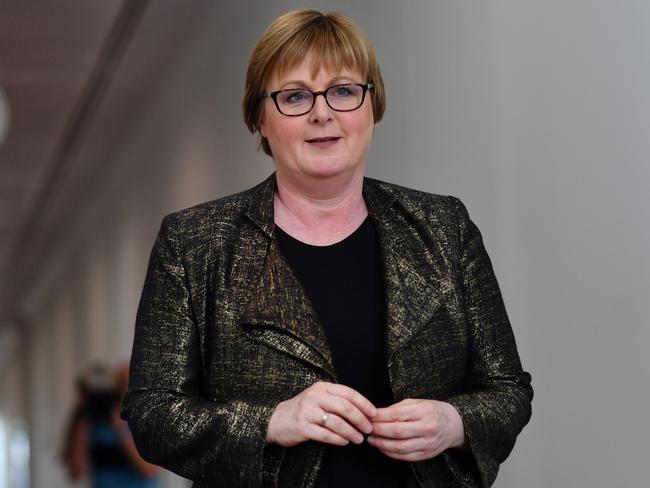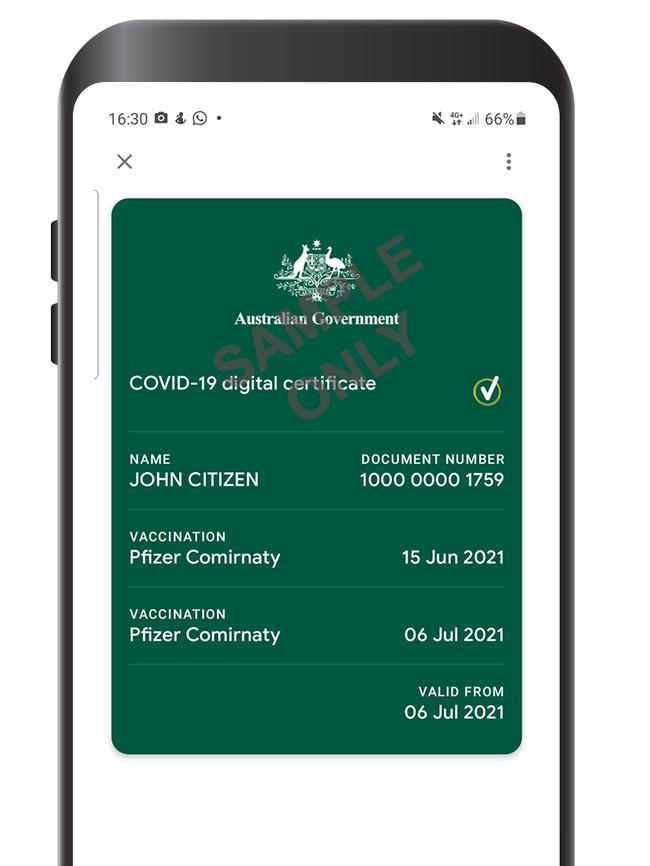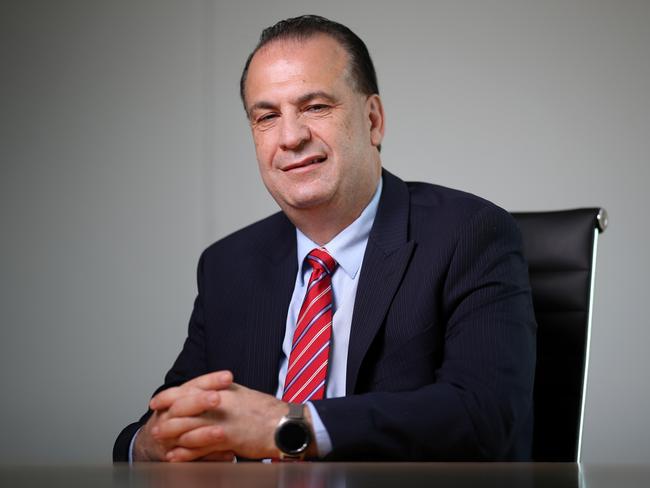Covid vaccination passport: Federal government takes first step with digital certificates for iPhone and Android
The first step towards launching an Australian Covid vaccination passport has been made, but not without controversy.
Coronavirus
Don't miss out on the headlines from Coronavirus. Followed categories will be added to My News.
The federal government today takes the first tentative step towards introducing a Covid-19 vaccination passport in a move that many industry groups have welcomed to re-open society for business.
But some said they wanted to be protected against claims of discrimination from potential customers who refused to show proof of a Covid-19 jab.
Services Australia, in a deal with Apple and Google, will now allow digital certificates to readily show Covid vaccination records on both iPhone and Android devices.
The certificates had been previously available through the myGov site, but as an organic health record could not be easily or quickly accessible.

Government Services Minister Linda Reynolds stopped short of confirming the government was set to introduce passports at major sporting, music or other events, akin to moves in the UK and Europe.
“The digital certificate is optional for Australians,” Senator Reynolds said.
“We are giving people control over the level of vaccination history they share, as the standalone certificate only shows Covid-19 vaccination status.”
But trade and industry bodies say they are willing to try anything to get the economy moving as long as they’re protected from those who refuse to show proof of vaccination.

The federal government’s own agencies, including the Department of Health, have advised a scheme could not work under the current legislation, citing the Privacy Act 1988 Section 94H on the use of even the CovidSafe app that says “a person commits an offence if the person requires another person to download, consent or have in operation” such a record, with a penalty of up to five years in jail.
Concerns have also been raised in national cabinet.
But Cafe Owners and Baristas Association of Australia spokesman Sean Edwards said he would support the idea of a vaccination passport if it got the industry back on its feet.
“Any initiative like that (a vaccination passport) that would ease restrictions (and) open things up would be welcome by our industry for sure,” he said.
Australian Hotels Association boss Ian Horne said requiring people to produce a vaccine passport to enter pubs, clubs and restaurants could help safeguard the hospitality industry.
He acknowledged the concept of vaccine passports “would have been creating real anxiety in our industry six months ago”.
But he said the ongoing threat of lockdowns and the damage they caused to businesses was starting to outweigh concerns over passports, so “you’d never say never” to the idea.
“(A vaccine passport) seems increasingly a safer way to go to allow us to continue to trade,” he said.
“What does the damage is the closures and the wastage and the loss of work for our employees or loss of income and yet all of our cost structures are still in place, whether it’s paying off debts to banks and things like that.”
The Australian Museums and Galleries Association’s national director, Katie Russell, said a passport scheme in some form would reassure.
She said museums and galleries were great reminders of resilience and survival during tough times, and between lockdowns people from all diverse backgrounds flocked to the cultural institutions for solace and reflection.
“We see vaccine passports as an opportunity for museums and galleries to welcome more visitors who might be eligible to cross borders and jurisdictions,” she said.
“It’s about accessibility. This could be a mechanism to do that.”
She said if national cabinet agreed to the proposal, the association would align and require a sighting of vaccination proof for entry.
Australian Hotels Association chief executive Stephen Ferguson said although there was a “level of desperation” for a lot of closed venues to reopen, there were still a lot of questions around how a vaccination passport would work.
“Our members are desperate. They want the doors open and to keep them open … they want the certainty they will not be shut down again and we will consider anything and be part of that discussion that will see us keep the doors open,” Mr Ferguson said.
“And if that’s a vaccine passport, (we are) happy to have that discussion; we will consider everything.”
Restaurant and Catering Industry Australia chief executive Wes Lambert said while the 48,000 restaurants, cafes and caterers his association represented were fully supportive of initiatives from state and federal governments, there had to be some assurances businesses would not be penalised.

While National Retail Association CEO Dominique Lamb said she backed vaccinations, her members had reservations as to how a passport system could work under the current privacy, discrimination and other WorkCover indemnity laws.
“For a retailer – whether here or overseas – having fewer lockdowns is incredibly important to the health of the industry … but you cannot discriminate against someone on the basis of inferred impairment or medical history and no one is required to disclose medical history,” she said.
“It’s highly unlikely retail stores would decline a customer on the basis they were not vaccinated.”
Despite some European countries requiring a passport for shopping centres, Shopping Centre Council of Australia director Angus Nardi said the industry here had not yet considered such a move.
Australian Retailers Association chief executive Paul Zahra said a passport in the retail sector could be overreach.
“While there may be merit in vaccine passports for enabling domestic and international travel, it would be an overreach to apply such a scheme to shopping, which is an essential activity for people to get the food, goods and services they need,” he said
Both Virgin Australia and Qantas have been looking at initiatives to support vaccination efforts. Qantas last week confirmed it would introduce a digital health smartphone app for international flights, allowing passengers to securely store and present proof of Covid-19 vaccinations, as well as the results of pre-departure Covid-19 tests.
Major music promoters Live Nation and Michael Chugg recently called for vaccination passports to allow music festivals and concerts to resume.
But Australian Festival Association chair Julia Robinson – who represents events such as Splendour in the Grass and Field Day – said while there was general support among the industry to get back to business as soon as possible, “there are operational issues to work through”.

Venues NSW chairman Tony Shepherd revealed anyone wanting to attend a major sporting event next year would need to be vaccinated, a position supported by ARL boss Peter V’landys.
“No sport can survive without crowds and Covid is not going away,” Mr V’landys said. “Crowds are such a major part of our revenue, along with memberships.”
An AFL spokesperson said: “The health and wellbeing of the community has always been the priority, and the AFL will continue to work with and be led by government and health officials on the return to crowds at AFL matches.”
A spokeswoman for the MCC, one of the nation’s oldest and largest sporting clubs with 140,000 members, said it would work closely with both state and federal government to consider all options in terms of Covid protocols.
“Whatever gets us there we would take,” she said.
More Coverage
Originally published as Covid vaccination passport: Federal government takes first step with digital certificates for iPhone and Android
Read related topics:COVID-19 Vaccine




